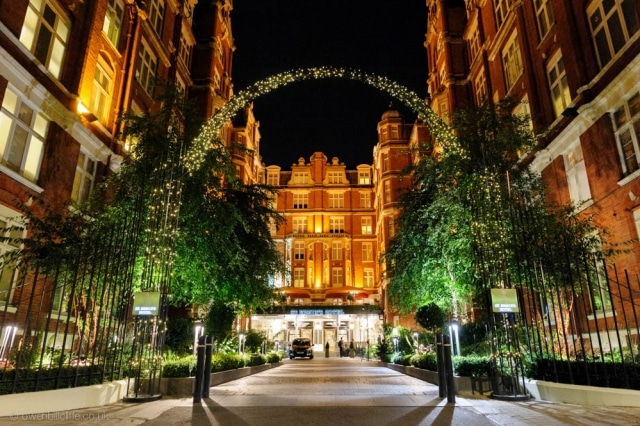DeSmog UK’s epic history series looks back at the conference that marked the first major event where climate sceptic views were promoted in England.
This year marks the 20th anniversary of Britain’s first major climate denial conference. You’ll never guess who attended – and who paid for it.
In October 1995, John Blundell – the newly appointed director of free market think tank the Institute of Economic Affairs (IEA) – opened his second major conference Environmental Risk: Perception and Reality at the four-star Stakis St Ermin’s Hotel on Caxon Street in London.
The advertised speakers included Blundell’s old friend Fred Smith, the founder of the Koch-funded Competitive Enterprise Institute (CEI), who had flown over from the United States along with the coal-funded sceptic scientist Dr Patrick Michaels.
Piers Corbyn, a former Marxist student radical and increasingly eccentric climate sceptic, was also among the panellists with Mike Fisher, IEA trustee and the son of the libertarian think tank founder Antony Fisher.
The conference was the first major event where climate denial was promoted in England, but they were included among a series of other environmental issues for which scientific findings had prompted public health officials to recommend tough new regulations.
A Lavish Affair
The £160-a-ticket event was a brilliant example of the strategy set out by the American tobacco companies where industries united in their opposition precisely because single-issue campaigns by vested interests would be distrusted by experts and members of the public.
One attendee remembers: “It was fairly lavish for an academics type of conference … a decent amount of money was splashed on it.”
The lobby of St Ermin’s Hotel. Photo: St Ermin’s Hotel via Creative Commons
Among those named on the attendee list were: Richard Ritchie from BP
The representatives of Britain’s most deadly industries were about to experience a masterclass in public relations. The conference presented the most convincing and compelling arguments for why businesses should be allowed to continue to produce products that endangered the lives of their customers and posed a serious risk to the natural environment. ‘Busy-Body Regulators’ Blundell had imported from the United States the latest arguments against state regulations in Britain, where the European Union was about to impose limits on tobacco and where support for the UN Intergovernmental Panel on Climate Change (IPCC) and climate mitigation was almost universal. Blundell and his cohorts presented safety regulations as the imposition of busy-body regulators consumed by their own ambition and power. The programme from the event gives an indication of how this was done. It stated: “Hazards exist all around us. Each day we make numerous judgements as to the level of risk posed by the hazards with which we come into contact … even the scientific community often lacks consensus as to what levels of risk are acceptable.” It went on to ask: “What are the implications for business, which must respond to the continual changes in our perception of risk and the responding regulatory climate? And how do we craft policy in the face of uncertainty?” Fred Smith’s talk was titled “Is the precautionary approach itself risky?” He set out the highly counterintuitive arguments that asbestos should not be considered dangerous, that airline safety standards were resulting in more deaths, and that huge American cars should be promoted as being safer. ‘Death by Regulation’ He told the audience: “At the CEI we are promoting this more balanced viewpoint, seeking out examples of overregulation that are, literally, lethal. We refer to the project as our ‘death by regulation’ project to dramatise the effect that the failure of government to consider the risks that are created by regulation are serious.” He concluded: “Regulating ourselves into poverty is tragic.” Michaels gave a talk shortly after lunch titled “Are claims of man-made climate change exaggerated, or are the risks as significant as predicted? Is there really scientific consensus on global warming?” He had recently published The Satanic Gases: Political Science of the Greenhouse Effect. During this talk, Michaels set out the arguments that would be used by British sceptics repeatedly over the coming decades. Dangerous Climate Change He complained that the treaty signed in Rio just three years prior failed to define “dangerous” climate change and demanded emissions must be cut if Bangladesh were to be badly hit – “even if the net benefit is positive” around the world. He said the document “allows the United Nations to dictate energy policy to sovereign nations” and was “designed to transfer massive quantities of wealth from producer to non-producer nations”. He said the IPCC procedures were “clearly a recipe for scientific disaster” because reviewers and lead authors were often funded by the same agencies. He introduced the allegation that the average global temperatures recorded by Professor Phil Jones, Director of the Climate Research Unit at the University of East Anglia (UEA), could have been distorted by the fact thermometers were surrounded by growing towns and cities, which produced their own localised warming. This argument would become a favourite attack on climate science and provided much of the ammunition around Climategate almost 15 years later when leaked emails from UEA found their way into the hands of climate denier bloggers. Significant Warming Michaels added: “Given the volume of arguments about recent global warming, one remarkable fact emerges: even in the global land based record there is no statistically significant warming from 1978 to 1993.” The fact that global warming progresses in fits and starts was pointed out by the IPCC‘s first report. However, this argument would be used again and again by the sceptics. Lord Lawson and his climate denial charity the Global Warming Policy Foundation repeatedly state that there has been no warming from 2000 to 2013 without acknowledging the long-term warming trend and the fact we are experiencing the warmest decade on record. Hired by Blundell to head up the IEA’s new Environment Unit, Roger Bate wrote in the IEA’s in-house journal published in conjunction with the conference: “Patrick Michaels considers the huge uncertainties surrounding global warming and the risks we actually face.” “His assertion that the risks are negligible is supported best by his discussion of scientific impropriety at the [IPCC]. Michaels repeatedly asked for the data resulting from the much heralded latest forecasting model. He alleged it was still predicting too much warming.” The war that would explode in the Climategate hacking scandal many years later. Funded by Coal It was unclear whether the conference delegates were aware that Michaels was funded by coal companies. But the programme did thank Procter & Gamble, ARCO Chemical Europe and Virgin Atlantic Airways for sponsoring academic bursaries for the conference. BHP Minerals, which mines coal, copper and iron, was recognised for “their generous contribution to this event”. Bate’s close friend Julian Morris and his IEA colleague Mark Pennington were both named among the “ARCO Chemical Europe Inc. Environment Fellows”. The event was considered by many delegates as a huge success, although many failed to recognise the significance of Michael’s contribution to attacking climate science. Bate, however, used the conference as the perfect spur to a new round of fundraising efforts, writing to tobacco, oil and chemical industry representatives that attended the conference. Bate’s assistant wrote to Dr Sharon Boyse of British American Tobacco sending his Wall Street Journal article attacking global warming and inviting her to lunch at the IEA on Valentine’s Day. Next time on our epic history series, the romance between Bate and Big Tobacco continues. We reveal how the affair became public. Photo: Owen Billcliffe photography via Creative Commons
Subscribe to our newsletter
Stay up to date with DeSmog news and alerts








